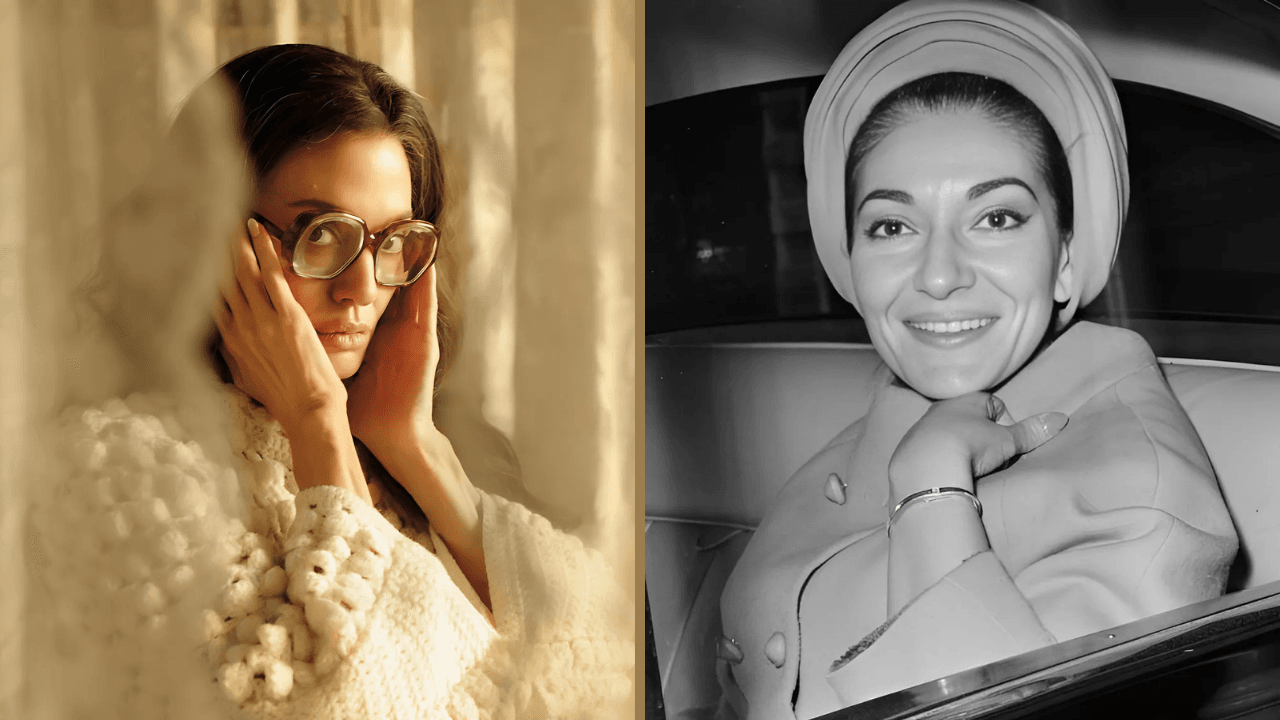Angelina Jolie never anticipated achieving every note as she took on the complex role of Maria Callas in Pablo Larraín’s film, “Maria.” However, immersing herself in the character and finding the depth of Callas’s breath opened up new emotional dimensions within Jolie—revealing feelings she hadn’t been aware of before.
In a candid interview, Jolie reflected on her journey of self-discovery while preparing for the role. “All of us, we really don’t realize where things land in our body over a lifetime of different experiences and where we hold it to protect ourselves,” she shared. With striking honesty, she acknowledged how emotions manifest physically: “We hold it in our stomachs. We hold it in our chest. We breathe from a different place when we’re nervous or we’re sad.” The initial weeks of her preparation were particularly challenging, as she had to rediscover how to breathe deeply and authentically—a vital component of embodying the legendary soprano. “That was a discovery of how much I wasn’t,” she added, illustrating the emotional journey that lay ahead.
“Maria,” which Netflix has released theatrically before its streaming debut on December 11, showcases Jolie’s powerful return to the screen. Though not necessarily the pinnacle of her career, it marks a significant highlight over the last decade. Since directing films and focusing on her role as a mother while raising her six children, Jolie has stepped back into the limelight. “So my choices for quite a few years were whatever was smart financially and short,” Jolie explained. “I worked very little the last eight years,” expressing how depleted she felt from her limited involvement in Hollywood.
Now, with her youngest children reaching the age of 16, Jolie finds herself reclaiming the spotlight. Her performance as Callas is poised to earn her a third Academy Award nomination, having previously won for her role in “Girl, Interrupted” in 2000. As she immerses herself in Callas’s life—an artist with a turbulent past and a complex legacy—“Maria” could end up being the defining role that solidifies Jolie’s place in cinematic history.
Interestingly, Jolie’s oldest children, Maddox and Pax, were part of the film’s production team. This experience offered them a new insight into their mother’s artistry. “They had certainly seen me sad in my life. But I don’t cry in front of my children like that,” she revealed, referring to the deep emotions Callas brought forth during her portrayal. “That was a moment in realizing they were going to be with me, side by side, in this process of really understanding the depth of some of the pain I carry.”
Though Jolie did not delve into specifics regarding her pain, it’s difficult to overlook how her emotional landscape might be intertwined with her lengthy and ongoing divorce from Brad Pitt, the father of her six children. Just before this interview, a judge allowed Pitt’s remaining claims against Jolie regarding the French winery Château Miraval to proceed, and on Monday, the court mandated that Pitt must provide documents related to allegations made by Jolie’s legal team, which they assert include communications pertaining to abuse—a claim Pitt has categorically denied.
Amid these personal trials, the aftermath of the recent U.S. presidential election hung in the air, but as a special envoy for the United Nations Refugee Agency from 2012 to 2022, Jolie preferred to focus on broader humanitarian issues rather than engage in political discourse. When asked about Donald Trump’s election victory, she emphasized the importance of storytelling: “Global storytelling is essential,” adding, “That’s what I’m focusing on. Listening. Listening to the voices of people in my country and around the world.”
Jolie’s ability to manage the complexities of her personal life—navigating media scrutiny and the questions that often accompany her celebrity status—aligns perfectly with the role of Callas. The film captures the latter days of the renowned American-born soprano, who passed away from a heart attack at 53 in 1977. Living mostly in her opulent Paris apartment and wrestling with her fading voice, Callas finds herself redefined by the weight of her past and the pressure of public expectation. At one point, a vocal instructor encourages her to reconnect with her true self: “I want to hear ‘Callas,’ not ‘Maria.’” Yet, as the film explores, the essence of Maria is crucial to understanding Callas.
Larraín’s film continues his artistic exploration of iconic 20th-century women, following “Jackie” and “Spencer.” In her role as Callas, Jolie embodies a regal presence, portraying a self-assured diva who poignantly articulates her struggles with lines crafted by screenwriter Steven Knight, such as, “I took liberties all my life and the world took liberties with me.” When asked if she resonates with that sentiment, Jolie replied without hesitation, “Yeah, yeah,” pausing to gather her thoughts.
“I’m sure people will read a lot into this and there’s probably a lot I could say but don’t want to feed into,” she added thoughtfully. “I know she was a public person because she loved her work. And I’m a public person because I love my work, not because I like being public. I think some people are more comfortable with a public life, and I’ve never been fully comfortable with it.”
When Larraín first approached Jolie about the role, he screened “Spencer” as a way to illustrate the type of intimate storytelling he envisioned. Larraín believed deeply that Jolie possessed the magnetic quality necessary to portray Callas—whose life, laden with intensity and artistic pressure, exemplified a rich inner world. “I felt she could have that magnetism,” Larraín remarked. “The enigmatic diva that’s come to a point in her life where she has to take control of her life again. But the weight of her experience, of her music, of her singing, everything, is on her back. And she carries that.”
With a shared understanding of the loneliness that accompanies fame, Jolie and Callas both navigate their individual experiences—with Jolie embracing the challenges of her newfound role as she unveils the complexities of one of opera’s most storied figures.
